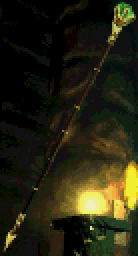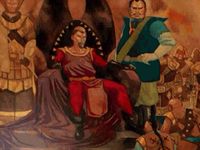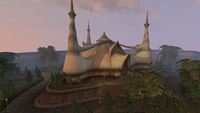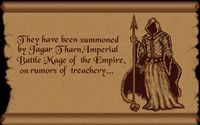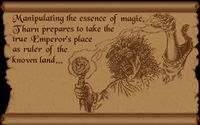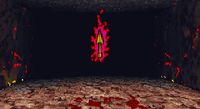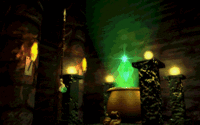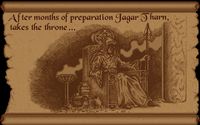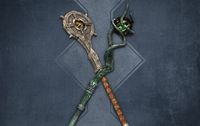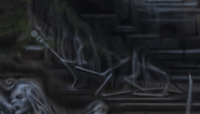Lore:Staff of Chaos
| Staff of Chaos | |||
|---|---|---|---|
 Staff of Chaos seen via Dream Bridge Staff of Chaos seen via Dream Bridge
|
|||
| Created | circa 1E 480 | ||
| Creator | Loreth the Fangleman | ||
| Destroyed | 3E 399† | ||
| Destroyer | Eternal Champion† | ||
| Appears in | Arena | ||
The Staff of Unity and Chaos,[1][nb 2] more commonly known as as the Staff of Chaos[2] or the Chaos Staff,[UOL 1] was a staff of great power and great historical significance to Tamriel.[2][3] The staff has also been known as the Balac-thurm,[4] and the Rod of Septim.[UOL 2]
History[edit]
Origin & Abilities[edit]
The Staff of Chaos was originally named "Balac-thurm" by its creator, a legendary enchanter known as Loreth the Fangleman circa 1E 480.[4][UOL 3]
Having been fangled from the essence of the Land itself, the staff was nigh-indestructible.[5] So too, it is said that the staff cannot be removed from Tamriel without the "direst consequences to the land."[6] In addition, the staff's wielder may "sow the seeds strife and dissension" wherever they go should they wish.[6] The power to destroy the corporeal form of one's enemies has also been witnessed among the staff's many abilities.[5] Some have speculated that the orb at the head of the staff may have been a Sigil Stone, as the Balac had the inherent ability to "open the gate between worlds."[7][5] A descendant of Loreth later attempted to recreate the magic potential of the Balac-thurm within two staves, which had meant harnessing the power of the Sun and Moon within each — powers which were ultimately determined to enter into an "unknown madness."[7]
Staff of Towers[edit]
Some scholars believe that the Staff of Towers, originally created by the Ayleid Lord Anumaril in the early First Era (and later used by the Marukhati Selectives during the Middle Dawn event), is the same artifact as the Staff of Chaos; but others point out that this would be impossible, as they each originate from entirely different time periods.[UOL 3] Additionally, the physical appearances and magical properties of the two staves are notably very different,[2][8] Notably, both these staves' shared a magical association with the Land and the Towers.[5][9][UOL 4]
Prophecy[edit]
The splitting of the Balac-thurm during a time of misrule was the first Event of prophecy depicted on Alduin's Wall, built by the Akaviri Dragonguard in the 1E 2800s to depict in stone the events that would preface the Waking of the World-Eater, a revelation said to have originated from an Elder Scroll; this legend became known as the Prophecy of the Dragonborn.[10][11][UOL 5] The staff is depicted as having been split apart into eight pieces, representing misrule taking its place at the eight corners of the world — an event that would later come to pass during the Imperial Simulacrum of Tamriel's Third Era.[2][UOL 5]
Of similar prophetic note, the Daedric Prince of Madness, Sheogorath, rather prehumously refers to the reassemblement of the Staff of Chaos in 2E 582, while dialoguing with the Vestige.[12]
Age of Tiber Septim[edit]
The journey of the Staff of Chaos from the hands of Loreth the Fangler to the grip of Emperor Tiber Septim is an unknown one, all that is known is that Septim possessed the thing during his war.[nb 1][6]
There were several battles in Tiber Septim's conquest of Morrowind.[13] In one of these battles, Mournhold is said to have been laid waste.[13] Tiber had allied himself with a male member of the Ra'athim lineage, who was on the rag-tail end of the family. With the help of this Ra'athim, the Empire recovered a powerful artifact from the depths of Mournhold that can see one clear from danger, the Horn of Summoning; which had been stored inside an ancient shrine dedicated to the ancestor god Ephen, who was entrusted to safeguard the artifact in ancient times by his brother.[nb 6] Tiber Septim claimed the Horn, but left the Staff of Chaos where it had laid for safekeeping under the watchful eye of General Symmachus.[6]
This Ra'athim was later rewarded by the Empire, having the fiefdom of Ebonheart bequeathed upon him for supplying his aid during the conflict. Additionally, General Symmachus of the Imperial Army later became the Prime Minister of Mournhold.[6] The Hlaalu of Ebonheart ultimately remained jealous that the Staff's safekeeping was assigned to the rulers in Mournhold, and not to their own fief, and claimed that rightful guardianship of the Staff of Chaos should be entrusted to Ebonheart. Mournhold responded that Moraelyn himself before had placed the Horn in the safekeeping of Ephen whose own bailiwick was Mournhold, and that Mournhold was arguably the god's birthplace, giving them the greater claim to the honor.[6][nb 1]
Theft from Mournhold[edit]
When Jagar Tharn began planning the theft of the Staff of Chaos is unclear. During his time as a mage-priest at the Temple of Sethiete in Camlorn, Jagar stole information on powerful spells, the location of the Staff of Chaos, and how the Staff could be used.[14] Circa 3E 376, a bard known as the Nightingale seduced Queen Barenziah of Morrowind, and she unwittingly revealed the location of the Staff of Chaos to the Nightingale, who then stole the Staff from its sanctuary beneath the city of Mournhold.[15][16][17][18] Queen Barenziah later recognized the Nightingale to be Jagar Tharn.[19][17] However, an alternative account asserts that the bard who stole the Staff of Chaos was actually a master thief named Drayven Indoril, a member of the Nightingale Trinity, and that the truth was covered up for political reasons.[18] After the Staff was given to Jagar Tharn, he attempted to kill Drayven Indoril, but Drayven escaped.[18] Jagar searched for Drayven but eventually abandoned the search.[18] Nevertheless, both versions of events state that it was Jagar Tharn who was ultimately behind the theft and took possession of the Staff of Chaos.[19][17][18]
Soon after the theft of the Staff of Chaos, Barenziah's consort Symmachus sent urgent communiqués to Uriel Septim VII.[16] Uriel VII expressed shock and displeasure at the Staff's theft and urged Symmachus to make every effort to locate its whereabouts and communicate developments to the newly appointed Imperial Battlemage, who was tasked with tracking down the Staff and those responsible for stealing it.[19]
Imperial Simulacrum[edit]
The staff played a central role in the Imperial Simulacrum. Jagar Tharn plotted for months to bring his plan to fruition.[20] Later in 3E 389, he requested to meet with the Emperor to discuss rumors of treachery.[nb 3][20][21] But when Uriel VII and General Warhaft arrived to discuss this, Jagar used the Staff of Chaos to imprison Uriel VII and General Warhaft in an Oblivion plane of his own creation.[nb 3][22][23][20][24]:180 Time moved much slower in this plane of Oblivion; thus, it would be centuries before Uriel VII died, and he would experience nothing but inexplicable and haunting nightmares.[23][25][26] When Ria Silmane learned of what Jagar Tharn had done to Uriel VII, she attempted to inform the Elder Council, but before she could inform them, Jagar used the Staff of Chaos to kill her.[27][17][20]
With his plot successful, Jagar drained the Staff of Chaos of its power, and he imbued its energy, along with his own life force, into the Jewel of Fire.[27][28] Then, he divided the Staff into eight pieces, and hid them throughout the Empire.[27][17] He took these precautions because the Staff of Chaos was the only item that could be used to free Uriel VII from Oblivion and because if someone did discover his deception, they would have to recover the pieces and reassemble the Staff, only to discover it to be useless without the Jewel of Fire.[27][28] Jagar used Illusion magic to assume the appearance of Uriel VII, and then he took the imprisoned Emperor's place on the Ruby Throne.[20][25][22]
As the Champion retrieved each piece of the Staff, Jagar used magical visions to threaten and taunt them, and Jagar sent his minions to try and defeat them.[28][2] Finally, the Champion retrieved the final piece of the Staff of Chaos from the mountain of Dagoth-Ur, but when they reassembled the Staff, Jagar mocked them, and he told them that he had drained the Staff of its power.[28][29] He taunted Ria's Champion to confront him in the Imperial Palace and retrieve the Jewel of Fire.[28] The Champion entered the Imperial Palace, and they fought their way through the halls of the Palace until they reached Jagar.[30] The Champion fought Jagar and defeated him, and then they used the Staff of Chaos to drain the power of the Jewel of Fire, which destroyed Jagar Tharn, and Uriel VII was returned to Tamriel.[30][23][22][31]
Fate[edit]
Ria Silmane speculated that touching the Staff to the Jewel of Fire would be enough to open the gate between worlds to free Emperor Uriel Septim VII, kill Jagar Tharn, and destroy the Staff in one fell swoop.[5][nb 3] The Staff was last witnessed floating around the Jewel of Fire and then dissolving to open the gate for Uriel, killing Tharn, which may or may not have destroyed the Jewel and the Staff itself in the process.[nb 4] The ultimate fate of the Staff of Chaos (and its power that had been infused in the Jewel of Fire) is unknown,[nb 5] though it has been said that the Staff had been shattered into pieces and lost to time.[32][7]
Legacy[edit]
An unknown descendant of Loreth later attempted to recreate the magic of the legendary Staff of Chaos by creating two new staves: the Arm of the Sun and the Arm of the Moon, together known as the Arms of Chaos, which reemerged during the Fourth Era.[33][7]
Previous Owners[edit]
- Loreth the Fangleman
- Moraelyn (contested)[nb 1]
- Ephen (contested)[nb 1]
- Tiber Septim
- Symmachus
- Drayven Indoril
- Jagar Tharn
- Eternal Champion
Gallery[edit]
Notes[edit]
- The Staff of Towers is another similar artifact that was split into eight pieces and scattered across Tamriel. In early drafts of the Main Quest for The Elder Scrolls Online, the Staff of Towers played a key role in the story and was called the Balac, meaning that it was the same artifact as the Staff of Chaos.[UOL 4] Though this story was later scrapped, the Staff of Towers was mentioned in some books and appeared in the Summerset Chapter, now being an entirely separate artifact.
See Also[edit]
- For game-specific information, see the Arena article on the Staff of Chaos.
References[edit]
- ^ The True Barenziah, Part VIII — Anonymous
- ^ a b c d e Events of the Main Quest of Arena
- ^ Alduin's Wall quest in Skyrim
- ^ a b The Final Lesson — Aegrothius Goth
- ^ a b c d e Ria Silmane's dialogue in Arena
- ^ a b c d e f g The Real Barenziah — Anonymous
- ^ a b c d Hyenril's Journal — Hyenril
- ^ The Psijic Order questline in ESO: Summerset
- ^ Aurbic Enigma 4: The Elden Tree — Beredalmo the Signifier
- ^ Esbern's dialogue in Skyrim
- ^ The Book of the Dragonborn — Prior Emelene Madrine
- ^ Sheogorath's dialogue during Long Lost Lore quest in ESO
- ^ a b Biography of Queen Barenziah — Stern Gamboge, Imperial Scribe
- ^ Mystery of Talara, v 4 — Mera Llykith
- ^ Royal Family Tree, The Daggerfall Chronicles — Ronald Wartow
- ^ a b The Real Barenziah, v 4 — Anonymous
- ^ a b c d e Biography of Barenziah, v 3 — Stern Gamboge, Imperial Scribe
- ^ a b c d e The Nightingales Vol. 2 — Gallus Desidenius
- ^ a b c The Real Barenziah, v 5 — Anonymous
- ^ a b c d e Arena Introduction Scene
- ^ Tamriel's Timeline, The Daggerfall Chronicles — Ronald Wartow
- ^ a b c Brief History of the Empire, v 4 — Stronach k'Thojj III
- ^ a b c A Life of Uriel Septim VII — Rufus Hayn
- ^ Battlespire Athenaeum — Ronald Wartow
- ^ a b French version of Arena's Manual Intro Story
- ^ English version of Arena's Manual Intro Story
- ^ a b c d Ria Silmane's dialogue in Arena
- ^ a b c d e Jagar Tharn's dialogue in Arena
- ^ Events of Dagoth-Ur in Arena
- ^ a b Events of The Imperial Palace in Arena
- ^ Assassination!
- ^ Skyrim: Creation Club: Arms of Chaos Official Summary
- ^ Events of Arms of Chaos creation for Skyrim
Note: The following references are considered to be unofficial sources. They are included to round off this article and may not be authoritative or conclusive.
